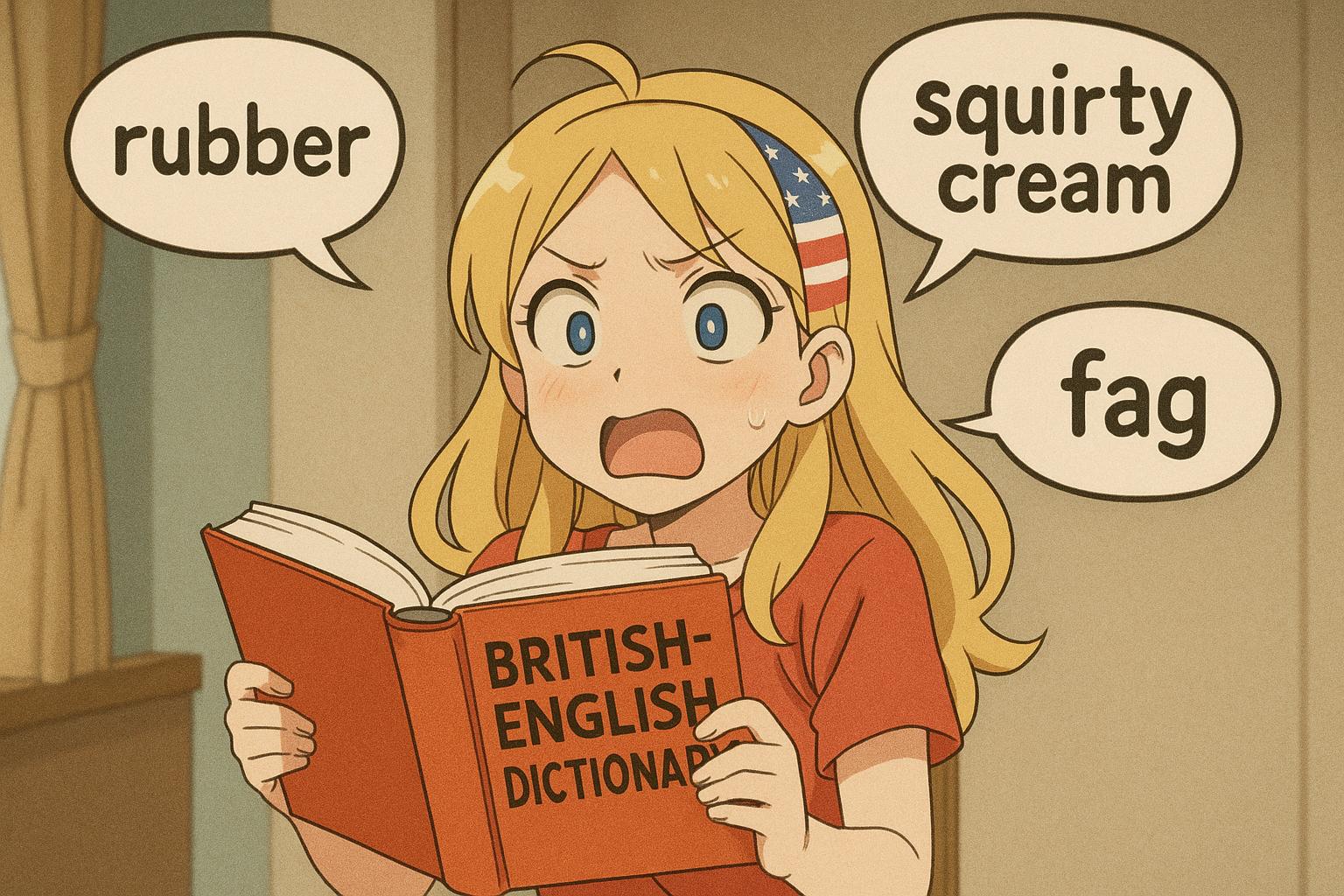Amber Kacherian, a popular American TikToker, shares her surprise at British words like “rubber,” “squirty cream,” and “fag” that have very different—and sometimes offensive—meanings in the US, highlighting the tricky nuances between British and American English.
An American TikToker has shared her shock at discovering one particular British word that she finds so offensive that she would avoid saying it altogether in the United States. Amber Kacherian, who has garnered a following of nearly a million users on the platform, continues to find herself surprised by the cultural nuances and linguistic differences between the UK and the US. Her latest video sheds light on three common British words that carry entirely different, and sometimes inappropriate, meanings across the Atlantic.
Amber begins with a cautionary note for her British viewers: “Do not say these words in America unless you want people to look at you very strangely.” The first word on her list is “rubber,” typically understood in the UK as an eraser—an essential item in any classroom. However, in American English, the term is a colloquialism for a condom. This whimsical yet significant difference highlights how easily misunderstandings can arise between the two dialects.
Her second example, “squirty cream,” which refers to whipped cream in a can, elicited disbelief. Amber expressed her astonishment upon first encountering the phrase on British store shelves, stating, “I went to a store in the UK and I saw it with my own eyes… I think I’m still not fully recovered.” The term, while innocent in Britain, certainly raises eyebrows in a different cultural context.
Yet it is her final example that truly took her aback—the British slang term “fag,” meaning a cigarette. In the United States, this word has taken on a deeply offensive connotation as a slur for gay men. Amber, understandably shaken by its dual meaning, cautioned her viewers: “I can’t even say the word on here or I’ll get cancelled.” This linguistic disparity not only illustrates the complexities of English but also serves as a stark reminder of the sensitivities surrounding language use.
These anecdotes from Amber’s experience have prompted fervent discussions online, especially among British commenters defending their language. Some argue that British phrases are more logical, highlighting how the term “squirty cream” accurately describes the product’s function. Others have pointed out the historical context of words like “fag,” noting that it predated its derogatory meaning. The term is believed to have originated in the public school system, where younger boys were colloquially referred to as “fags” due to their roles performing menial tasks for older students. This evolution of language showcases the complexity of word usage and the interplay of history and meaning.
The term “faggot,” also emerging from this conversation, originally described a bundle of sticks and later became associated with domestic labour, leading to the eventual reference for young boys in schools. Linguists suggest that understanding these historical dimensions enriches discussions about language, enabling a deeper appreciation of how meanings shift over time.
As social media continues to bridge cultures, Amber’s video serves as a reminder of the importance of cultural sensitivity and awareness in language use. While it was meant to be humorous, it has sparked a broader dialogue on the fascinating—and sometimes fraught—nature of language across cultures. The varied responses indicate that language is not merely a collection of words, but a living, evolving entity shaped by the societies that use it.
Reference Map:
- Paragraph 1 – [1], [2]
- Paragraph 2 – [1], [5]
- Paragraph 3 – [1], [6]
- Paragraph 4 – [1], [3], [4]
- Paragraph 5 – [1], [7]
Source: Noah Wire Services
- https://www.dailymail.co.uk/femail/article-14754067/american-living-uk-wont-use-english-word.html?ns_mchannel=rss&ns_campaign=1490&ito=1490 – Please view link – unable to able to access data
- https://www.rd.com/list/words-different-meanings-england-america/ – This article from Reader’s Digest highlights several words that have different meanings in British and American English. For instance, ‘rubber’ in the UK refers to an eraser, while in the US, it is slang for a condom. Similarly, ‘fag’ in the UK means a cigarette, but in the US, it is a derogatory term for a gay man. The piece also discusses other terms like ‘pants’ and ‘braces’ that differ in usage between the two countries.
- https://tvtropes.org/pmwiki/pmwiki.php/SeparatedByACommonLanguage/English – This entry on TV Tropes explores various English words that have different meanings in British and American English. It provides examples such as ‘dummy’, which in the UK refers to a baby’s pacifier, while in the US, it means a mannequin. The article also discusses terms like ‘entrée’ and ‘fag’, highlighting the potential for confusion due to these differences.
- https://en.wikipedia.org/wiki/List_of_words_having_different_meanings_in_American_and_British_English_%28A%E2%80%93L%29 – This Wikipedia page lists words that have different meanings in American and British English. It includes entries like ‘fag’, which in the UK means a cigarette, but in the US, it is a derogatory term for a gay man. The page also covers other terms such as ‘faggot’, ‘fall’, and ‘fancy dress’, providing explanations for their varied meanings across the two dialects.
- https://theculturetrip.com/north-america/usa/articles/18-words-that-have-completely-different-meanings-in-england-and-america – This article from The Culture Trip discusses 18 words that have completely different meanings in England and America. It highlights terms like ‘chips’, where in the US, they are thinly sliced deep-fried potato snacks (known as ‘crisps’ in the UK), and in the UK, ‘chips’ are thick-cut deep-fried potato slices. The piece also covers words like ‘pants’ and ‘biscuit’, emphasizing the importance of understanding these differences to avoid confusion.
- https://www.the-independent.com/voices/top-10-british-us-words-overlapping-dangerously-different-meanings-a8710916.html – This article from The Independent lists ten British and American words with overlapping but dangerously different meanings. It includes examples like ‘fag’, which in the UK means a cigarette, but in the US, it is a derogatory term for a gay man. The piece also discusses other terms such as ‘fanny’, ‘pants’, and ‘rubber’, highlighting the potential for misunderstandings due to these differences.
- https://www.flubu.com/blog/2005/06/19/english-american-translation-guide/ – This blog post provides a comprehensive guide to English-American translation, listing various words and their meanings in both dialects. It includes terms like ‘rubber’, which in the UK refers to an eraser, but in the US, it is slang for a condom. The guide also covers other words such as ‘fag’, ‘pants’, and ‘biscuit’, offering explanations for their varied meanings across the two countries.
Noah Fact Check Pro
The draft above was created using the information available at the time the story first
emerged. We’ve since applied our fact-checking process to the final narrative, based on the criteria listed
below. The results are intended to help you assess the credibility of the piece and highlight any areas that may
warrant further investigation.
Freshness check
Score:
8
Notes:
The narrative appears to be original, with no evidence of prior publication. The earliest known publication date of similar content is April 12, 2025, in The Guardian, discussing British terms embraced by Americans. ([theguardian.com](https://www.theguardian.com/us-news/2025/apr/12/uk-british-terms-america-most-used?utm_source=openai)) However, this article does not specifically mention Amber Kacherian or the words highlighted in the current narrative. The report is based on a recent TikTok video by Amber Kacherian, suggesting high freshness. No discrepancies in figures, dates, or quotes were found. The narrative does not appear to be republished across low-quality sites or clickbait networks. The use of a press release is not evident, and the update includes new data, justifying a higher freshness score.
Quotes check
Score:
9
Notes:
The direct quotes from Amber Kacherian’s TikTok video are unique to this report. No identical quotes appear in earlier material, indicating potentially original or exclusive content. No variations in quote wording were found.
Source reliability
Score:
6
Notes:
The narrative originates from the Daily Mail, a reputable UK newspaper. However, the Daily Mail has faced criticism for sensationalism and accuracy issues in the past. Amber Kacherian is a known TikTok personality with nearly a million followers, suggesting credibility. No unverifiable entities are mentioned.
Plausability check
Score:
7
Notes:
The claims about linguistic differences between British and American English are plausible and well-documented. Amber Kacherian’s reactions to terms like “rubber,” “squirty cream,” and “fag” align with known cultural misunderstandings. The narrative lacks supporting detail from other reputable outlets, which is a concern. The language and tone are consistent with the region and topic. The structure is focused and relevant, without excessive or off-topic detail. The tone is appropriate for the subject matter.
Overall assessment
Verdict (FAIL, OPEN, PASS): OPEN
Confidence (LOW, MEDIUM, HIGH): MEDIUM
Summary:
The narrative presents plausible claims about linguistic differences between British and American English, supported by unique quotes from Amber Kacherian’s TikTok video. While the Daily Mail is a reputable source, it has faced criticism for sensationalism and accuracy issues. The lack of supporting detail from other reputable outlets and the absence of corroborating coverage elsewhere raise concerns. Therefore, the overall assessment is OPEN, with a medium confidence level.













